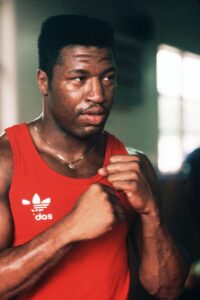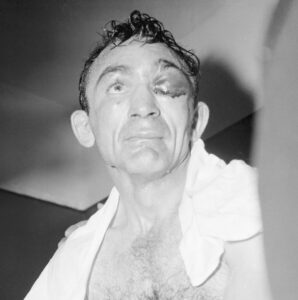Explore about the Famous Boxer Ray Mercer, who was born in United States on April 4, 1961. Analyze Ray Mercer’s net worth, age, bio, birthday, dating, height-weight, wiki. Investigate who is Ray Mercer dating now? Look into this article to know how old is Ray Mercer?
Ray Mercer Birthday Countdown
Ray Mercer Biography
WBO World Heavyweight Champion, NABF Heavyweight Champion, made a splash by converting to kickboxing and MMA.
He won the 1988 United States Amateur Championships as a Heavyweight.
He defeated UFC Heavyweight Champion Tim Sylvia via knockout in 9 seconds, becoming the first man to beat Sylvia by knockout.
He was accused of hitting his girlfriend in Fayetteville, North Carolina in 1995.
He lost to Wladimir Klitschko on June 29, 2002, denying him the WBO Heavyweight title.
Mercer served with the USAREUR, V Corps, infantry, he was stationed with Company D, 1st Battalion, 39th Infantry, in Baumholder, West Germany. His latest military rank was sergeant.
Raymond Anthony “Ray” Mercer (born April 4, 1961) is a retired American professional boxer, kickboxer, and mixed martial artist who competed from 1989 to 2009. Best known for his boxing career, Mercer won a heavyweight gold medal at the 1988 Summer Olympics as an amateur, and later held the WBO heavyweight title from 1991 to 1992 as a professional. As a mixed martial artist, he scored a notable first-round knockout win over former two-time UFC heavyweight champion Tim Sylvia in 2009.
Mercer started boxing at the age of 23 while serving in the U.S. Army in West Germany. Mercer said he had never even put on a pair of gloves until after he enlisted, “The Army taught me everything I know about boxing,” explained Mercer. While he had street fights as a youth, it wasn’t until he was offered a chance to avoid a 30-day field exercise by serving as a sparring partner for the post’s heavyweight champion, which in winter of 1984, with the wind-chill factor driving temperatures below zero, was quite an opportunity, that he found a sanctioned way to use his aggression. The beginnings were tough, “I came back from that first day of sparring with a bleeding nose and my lips swollen. For two months I got pounded. But then it became a challenge. I’m not a quitter. I figured the other guy learned the moves, so could I.” He learned quickly enough, winning military titles and a United States Amateur Boxing Federation title. He became 1985 U.S. Army and inter-service heavyweight champion, along with Wesley Watson, who was inter-service superheavyweight champion (Mercer later beat Watson in professionals). But in 1985, when Army Coach Hank Johnson sought to recruit Mercer for a stateside training camp for the 1988 Olympics, Mercer turned down the offer. “I was in my prime at partying. The training was not a sacrifice I wanted to make. I told Hank, you won’t see me until the Olympics”, he said. He first boxed in organized competition in 1983 at Schweinfurt, West Germany. He won a battalion box-off and then won the brigade championship. “After that, I won the VII Corps novice and open championships and was runner-up at U.S. Army, Europe,” Mercer said. When he was reassigned to Baumholder, he won three USAREUR crowns while carrying the banner for V Corps (he won the USAREUR Championship less than a year after his first amateur fight.) As he served with USAREUR, for that reason in 1986—1987 Mercer had several international bouts in Germany, he also competed internationally at Western Europe open tournaments. In summer of 1988 he again won the inter-service heavyweight championship. His next step was to apply for the all-Army boxing trial camp and win a spot on the Army team. “Right now, I want to be the ‘woodwork’ man. I’m 26 years old and relatively unknown. My plans are to stay healthy, and I need to do well in international competition prior to the Olympics to build confidence.”
United States Armed Forces Championships (heavyweight), Camp Lejeune, North Carolina, November 1985:
USAREUR Boxing Championships (heavyweight), Darmstadt, West Germany, May 1985:
Stockholm Box Open (heavyweight), Stockholm, Sweden, January 1986:
Copenhagen Cup (heavyweight), Copenhagen, Denmark, December 1987:
Upon winning the 1988 Olympics he was named Armed Forces Athlete of the Year in November 1988 (which was quite an achievement, considering that the Army branch alone produced 19 Olympians in 1988.) In January 1989, being honorary discharged, Mercer left the Army to pursue a professional boxing career.
Olympic Box-offs (heavyweight), Caesars Palace, Las Vegas, Nevada, July 1988:
Olympic Trials (heavyweight), Concord Pavilion, Concord, California, July 1988:
United States Armed Forces Championships (heavyweight), Naval Air Station San Diego, San Diego, California, March 1988:
Mercer knocked out all four of his Olympic opponents, winning Gold of the 1988 Olympics in Seoul as a heavyweight. When asked if he thought he needed to stop the South Korean in order to win the gold medal, he replied: “Definitely. Or I’ll make him wish he was knocked out. One of the two.” He was the oldest member of the United States Olympic Boxing Team at 27.
Going to the Olympic Team, he was one of the most highly regarded American Olympic boxers. Of all the U.S. 1988 Olympians, Angelo Dundee, a legendary trainer, chose Ray Mercer and Andrew Maynard, as the most likely to develop into world champions after they would have turned into professionals: “Mercer’s 27, but that’s not too old. The maturity is there. And the punch. Give him 10 fights as a pro and he’d be ready to start moving up,” Dundee said on Mercer’s potential as a pro. According to Kelvin Richardson of the ’88 All-Army Team, Mercer was such a hard puncher, that even 16-ounce gloves weren’t of much help for his sparring partners from being knocked off the ring, and his superheavyweight Olympic teammate, Riddick Bowe, didn’t want to spar with Mercer for that reason.
He won the 1988 United States amateur heavyweight championship. At the USA vs. Cuba match-up, Mercer twice staggered Félix Savón, but was impeded from doing further damage by questionable intervention by the Cuban referee, Alfredo Toledo. At the USA vs. Europe match-up, Mercer with a hard right to the nose turned it into a “No mas!” fight for Yugoslavian Željko Mavrović.
Mercer turned pro in January 1989 and debuted with a 3rd TKO of Jesse Hughes. He scored a series of knockouts and in August 1990 knocked down and outpointed big punching Smokin’ Bert Cooper in a spectacular 12 round brawl that earned him Cooper’s NABF title. In January 1991 he challenged undefeated Francesco Damiani for the WBO heavyweight title, scoring a one punch knockout victory in the 9th when behind on points. Later that year he beat undefeated puncher Tommy Morrison in five, and with a major world title fight on the horizon vacated his WBO belt and fought 42-year-old legend Larry Holmes rather than mandatory challenger Michael Moorer. It proved an unwise decision, as the crafty Holmes conned Mercer out of the fight, outjabbing the puzzled Mercer and gaining both the points decision, and Mercer’s world title fight with heavyweight king Evander Holyfield.
Having split fights with dangerous veteran Jesse Ferguson (Mercer was investigated for allegedly asking Ferguson to “throw the fight” during their first encounter), labored when overweight to a draw with trialhorse Marion Wilson, and saw a proposed 1994 bout in Hong Kong with Frank Bruno fall through, Mercer enjoyed an unexpected run of form in major fights, losing on points in a thrilling brawl with Holyfield in May 1995, losing a controversial decision in another wild punch up, this time with Lennox Lewis, in June 1996, and scoring a controversial points win over ex-champ Tim Witherspoon in yet another high action bout in December 1996. In the frame for a bout with Andrew Golota in 1997, Mercer suffered a neck injury and was out of action for 14 months. He returned February 1998 with a 2-round KO of Leo Loiacono, but contracted Hepatitis B and was again inactive, this time for 20 months.
In February 2001 a 39-year-old Mercer launched a final comeback, knocking out four journeymen before being matched with WBO title holder Wladimir Klitschko in a high-profile bout on HBO. Once famed for his incredible iron chin, Mercer looked his age and was knocked down in the first and stopped in the 6th. A brief dalliance in the mixed martial arts nixed a 2004 bout with DaVarryl Williamson. However, Mercer did return to boxing in 2005, now aged 44, but he was stopped in seven rounds by Shannon Briggs.
Continuing to seek a fighting career, Mercer opted to travel to Japan and challenged Musashi in the kickboxing combat sport K-1 on June 6, 2004. Mercer held a reasonable account of himself, but his age and inability to successfully defend kicks was evident as he went on to lose the bout via unanimous decision. On March 19, 2005, he had one more K-1 bout against Remy Bonjasky, to whom he lost via verbal submission. The first and only strike of the night, a head kick, landed square on the head of Mercer. It wasn’t your typical fight; Mercer took the head kick and then quit the fight.. As Mercer put it, “I got the shit kicked out of me”. [1]
After a series of scheduled boxing matchups fell through (including a proposed bout against former champion Hasim Rahman), Mercer decided to try mixed martial arts (MMA) and approached Felix Martinez, co-founder of Cage Fury Fighting Championships, about working with the promotion. On March 21, 2007, Cage Fury announced that Mercer had signed to face underground street fighter and Internet legend Kimbo Slice at Atlantic City’s Boardwalk Hall on June 23, 2007, as part of Cage Fury Fighting Championship 5. The bout was a non-sanctioned exhibition under the New Jersey Unified MMA rules.
On June 13, 2009, Mercer made a big splash when he defeated former UFC Heavyweight Champion Tim Sylvia at Adrenaline III: Bragging Rights. He won the fight via knockout in 9 seconds with a huge right hand to the chin, becoming the first man to ever defeat Sylvia by knockout.
In March 2010, it was announced that Mercer had signed with the King of the Cage organization, although no bouts would materialize.
Summer Olympics (heavyweight), Seoul, South Korea, September–October 1988:
USA–Canada Duals (heavyweight), Charlotte Coliseum, Charlotte, North Carolina, August 1988:
USA–Europe Duals (heavyweight), Las Vegas Convention Center, Las Vegas, Nevada, June 1988:
USA–Cuba Duals (heavyweight), Caesars Atlantic City, Atlantic City, New Jersey, April 1988:
United States National Championships (heavyweight), Colorado Springs, Colorado, March–April 1988:
United States National Championships (heavyweight), Colorado Springs, Colorado, March–April 1988:
USA–FRG Duals (heavyweight), Peissenberg, West Germany, July 1987:
USA–FRG Duals (heavyweight), West Berlin, West Germany, July 1987:
USA–USSR Duals (heavyweight), Troy, New York, October 1985:
What's Ray Mercer Net Worth 2024
| Net Worth (2024) | $1 Million (Approx.) |
| Net Worth (2023) | Under Review |
| Net Worth (2022) | Under Review |
| Net Worth (2021) | Under Review |
| Net Worth (2020) | Under Review |
Ray Mercer Family
| Father's Name | Not Available |
| Mother's Name | Not Available |
| Siblings | Not Available |
| Spouse | Not Available |
| Childrens | Not Available |






